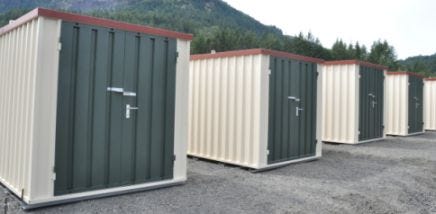Supplier Case Study: BOS Container USA Helps Washington Self-Storage Business Expand
Pak Rat Mini Storage Owner B.F. "Dutch" van Rijn was running out of self-storage units to rent at his facility in North Bonneville, Wash. To continue growing the business, he purchased an adjacent parcel of land and considered building additional units. Then he stopped to consider his options. That’s when he discovered the possibility of adding portable-storage containers to his property instead of constructing new buildings.
June 17, 2016
Pak Rat Mini Storage Owner B.F. "Dutch" van Rijn was running out of self-storage units to rent at his facility in North Bonneville, Wash. To continue growing the business, he purchased an adjacent parcel of land and considered building additional units. Then he stopped to consider his options. That’s when he discovered the possibility of adding portable-storage containers to his property instead of constructing new buildings.
After carefully researching portable-storage options, van Rijn decided to purchase quick-build containers from BOS Container USA. He even traveled to San Francisco International Airport to see the containers in action, being used by United Airlines.
“I was impressed by the quality of the units. They’re well-built and designed, easy to construct; and they offer size flexibility, as units can be ‘linked’ together,” van Rijn says. “The unit fit and finish is very good, and they’re sturdy, utilizing 20-gauge steel.”
van Rijn’s order of BOS containers arrived in May, flat-packed in three sea containers. The units ranged in size, including 7-by-7, -10, -13, -20 and -27. The 7-by-27 container (two 7-by-13 containers joined end-to-end using a proprietary connection kit) took a team just 20 minutes to assemble. van Rijn altered the units to fit his corporate image by painting the doors and trimming the side of the roof panel.
Taking the Plunge
There were several factors that led van Rijn to choose BOS containers, which are manufactured in Germany and made of galvanized, recycled steel. The units have a high degree of flexibility, with the ability to connect multiple containers together. “Future market-size requirements might change, and the BOS units can change with it,” van Rijn says.
Further, many portable units on the market don't allow for adequate ventilation, which is important for long-term storage. While a sound, weathertight unit is essential, the container must also be able to “breathe” to avoid moisture buildup—particularly in the Pacific Northwest, where variable weather conditions mean “air-tight” isn’t an option.
Pak Rat’s site also features rocky soil, making it problematic for pouring a foundation. Building such permanent structures would’ve been more labor-intensive, costly and time-consuming.
Finally, the portable units are a tax consideration because they can be depreciated over seven years. “The recently purchased units have been well-received by the market, and we will be doing business with BOS in the future,” van Rijn says.
To learn more about BOS Container USA and its line of products, view this video or visit www.boscontainer.com.

You May Also Like





